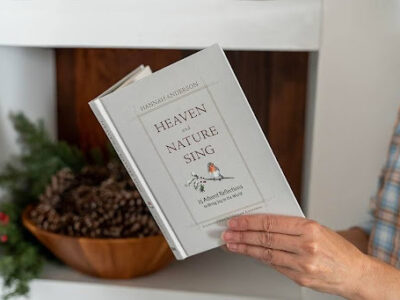The Bible is by far the most important text for Christians around the globe. So when challenges of a global scale surface, of course, we ought to turn to our scriptures to see if we can discern any answers from God’s Word about how we should be treating God’s World.
If you’re on the hunt for a biblically based study of how God calls us to take care of the earth, here are three places I recommend starting:
The Green Bible
If you want to know what the Bible says about creation care, start with the Bible.
The Green Bible is a study bible designed for those of us who long to understand God’s heart for creation. It is a “green-letter edition,” which highlights in green print all of the “rich and varied ways the books of the Bible speak directly to how we should think and act as we confront the environmental crisis facing our planet.” The green-letter passages showcase how God and Jesus interact with, care for, and are intimately involved with all of creation, how the elements of creation are interdependent, how nature responds to God, and how we are called to care for creation.
This NRSV Bible also includes a “green subject index” to help you find passages of scripture that cover topics like animals, caring for your neighbor, land, and water; as well as a Green Bible Trail Guide, which is a series of Bible studies on the main themes of creation care.
Archbishop Desmond Tutu writes in the Foreword to The Green Bible, “As you read The Green Bible starting in Genesis, you will see that after God created birds, fish, and animals he created humans to be his viceroys and to act “compassionately and gently” toward all forms of life. The future of our fragile, beautiful planet home is in our hands.”
In addition to Archbishop Tutu’s poignant words, essays by other scholars, conservationists, and theologians are included to offer insights on reading the Bible through a “green lens,” as well as teachings about creation from the church fathers and mothers throughout the ages.
It’s a beautiful version of Scripture for anyone who is in pursuit of God’s heart for creation.
Biologos Foundation
If you’re hungering for the latest in the conversation between modern science and modern faith, I can think of no better online resource than The BioLogos Foundation.
BioLogos was founded by Francis S. Collins, former director of the NIH and one of the world’s leading scientists and geneticists. He led an international collaboration that first mapped the entire human genome. BioLogos’ mission is to “explore God’s Word and God’s World to inspire authentic faith for today.”
Three core values drive their vision and mission: Christ-centered Faith that upholds the authority and inspiration of the Bible, Rigorous Science, and Gracious Dialogue.
The Foundation has so many valuable resources on its site, but let me call out just a few that I’ve found especially helpful and informative when it comes to considering God’s Word and Creation Care:
- God’s Relationship to Creation Articles: Among the website’s catalog of Common Questions are pages and pages of content addressing the most frequently asked questions having to do with creation care, including why Christians should care for creation, animal suffering, and more.
- The Language of God Podcast: This faith and science podcast has been running strong since its founding in 2018, with 197 episodes as of the writing of this article. In some way, every single episode seeks to engage with both God’s Word and God’s World. Search through the archives or tune in to the latest episodes for a taste of the vast and wondrous ways God’s Little Book and Big Book are in dialogue with each other.
- Integrate Curriculum: Last year, BioLogos rolled out this terrific supplemental curriculum series for high school students who want to uphold the rigor of scientific study while also examining what this knowledge means in relation to their faith. I had the privilege of previewing this material and testing it out with our high school youth group, and the conversations it provoked were inspiring. There’s a whole unit on creation care that provides rich content and more material than you could ever imagine to help students (and adults) integrate faith and science.
- Faith & Science 2024 Conference: In the fall, BioLogos hosted the Creation Care Summit, which focused all its time and energy on the latest creation care. It was an excellent event. The next conference on the docket is Faith & Science, which brings together scientists, poets, theologians, ecologists, philosophers, sociologists, and more to engage in a dynamic conversation about contemporary issues in these two areas.
You can tell I’m a big fan of this organization, right?
If you’re feeling a little guarded about all of this overlap between faith and science, the last of these three essential resources might make you feel more at ease.
Ask Your Denomination about Creation Care
I didn’t go hunting for every single denomination’s statement on creation care because it would take too long, but every denomination I could think of has something to say about creation care.
And guess what? They are all rooting their call to care for creation in Scripture.
This isn’t just a mainline Protestant movement or a Catholic initiative or a low-church, high-church, grassroots, progressive, or conservative call to action.
Creation care is global. It is universal. The entire Church with a capital C agrees that Christians ought to care for creation. Here are a few sites to get you started, but if your denomination isn’t listed, then do a quick Google for your denomination “and creation care,” and see what turns up.
- AME Church and Climate Solutions
- Baptist Creation Care Initiative
- The Catholic Laudato Si’ Encyclical Letter from Pope Francis, “On Care for Our Common Home” and a Summary of the Pope’s Letter
- Christian Reformed Church Creation Care Position Statement
- Church of the Brethren – Brethren Creation Care Network
- Episcopal Church
- Evangelical Environmental Network – An Evangelical Declaration on the Care of Creation
- The ELCA Caring for Creation Social Statement
- Greek Orthodox Liturgy and the Care for Creation
- Statement on the Environment by the Russian Orthodox Church
- The United Methodist Church Social Issues Statement on Creation Care
God’s Word is filled with the good news about our wonderful creation. Now go, be fruitful, multiply, and make disciples of God’s love for all of creation.





 Copyright
2025
Root and Vine
Copyright
2025
Root and Vine